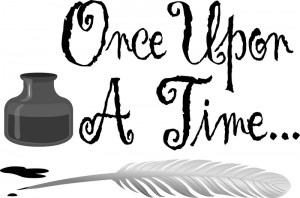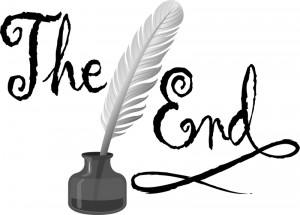One of the wonderful things about NaNoWriMo is it forces thousands of writers to get the writing party started. This raises the question of: Now what?
The answer is deceptively simple: FINISH IT.
Okay, I can’t leave it at that. Simple answers just aren’t in my nature. Why? It’s because the simplest answers often hold the hardest truths, and most difficult objectives.
The goal of NaNoWriMo is to write 50,000 words in a month. Keep in mind that the goal isn’t 50,000 immediately publishable words. I’ll circle back to that point in a moment. Most adult-reader novels (and no, I’m not taking about those at the top of the rating system, but all books that fall outside the picture, children’s, and middle grade markets) these days are more than 50,000 words. Young Adult novels use to fall into the 50-60,000 range, but with the breakaway success of the Harry Potter and Twilight franchises, Young Adult often exceeds this mark as well. Books in the fantasy genre tend to be on the higher end of the word count spectrum. If you’re not Brandon Sanderson or George R.R. Martin, your likely word count is between 80,000 and 120,000 words. Romance and Thrillers tend to ranger closer to the70- 80,000 word mark. So, our task isn’t done when at the end of November we hit the magical 50,000 words. We can’t spell check and e-mail the partially-finished manuscript out to our top ten fantasy agents and expect them to rush to represent us. Seriously, don’t do this.
Tip #1 then is to write until done. Whether you need another 20,000 words or another 60,000 words, you must finish the story and type “THE END.” Having the privilege of typing that phrase a number of times, let me tell you it’s the best feeling. Revel in it for a day or two. By typing “the end” you’ve done what most of the want-to-be writers never do. You’ve finished the story. Congratulations. It’s a huge accomplishment.
But, you’re not ready to hit send yet. RULE 1 – and unlike pirate “rules” you are not allowed to ignore this one – No story should go from the first time you type “the end” immediately into an agent’s or editor’s hands. The story isn’t ready, and worse, if you had a connection with that person, you might have wasted your “big chance” on an inferior product. Hopefully, your first draft isn’t far off the mark, but everyone needs some editing before publication.
A very wise and funny lady once told me “give yourself permission to write a crappy first draft.” Thank you, Lisa Scottoline for that advice. The saying isn’t unique to Lisa, but she’s the first person I heard it from where it sank in. I mentioned above very few people can write 50,000 publishable words on the first pass. I think outliners have an advantage over pantsers like me because the outliner already beta-tested, as it were, the story’s structure. For most of us, the hard work comes after we type “the end” and start the editing phase.
Tip #2 – Put the draft away.
We fall in love everytime we write. I love my characters, even the really horrible people, and their story by the time I type “the end.” I’ve spent months or years with them. Like any other parent, this unconditional love means I’m blind to the characters’ and story’s flaws. I generally need at least a month before I can objectively look at a novel I’ve written before I can wade into the forest of words with a machette. Take at least a week. Longer if you can. The distance will grant you objectivity, and you’ll need that for the editing/ rewriting process.
Tip #3 – Outline the story.
Okay, this is where opinions will vary widely and you’ve going to need to experiment to find out what works for you. Tip 3 is where the editing process starts. Whether you are an outliner or a pantser, my recommendation is to outline your completed story to ensure you hit all the “beats” you need. I’ve written about the Hollywood Formula of story telling here before and we just had a great review of Blake Snyder’s Save The Cat which uses this formula here so I won’t replow this ground. Please check out those two posts because the outlining and story telling techniques set out in both are helpful in structuring a story or fixing one when it’s leaped the tracks. If you use this method to dissect your story, the “what’s missing” to take this from fair, to publishable, to kick-butt runaway sucess become obvious which makes the editing process less painful.
Tip #4 – It’s okay to delete.
This tip is a version of Stephen King’s imfamous phrase, “kill your darlings.”
I had a professor who was also a playwright. He’d adapted a well known classic novel that hadn’t been previously adapted to the stage. One of the reasons, I think, this particular work of this very well known and revered writer hadn’t been adapted was the “novel” was originally published week-by-week in a newspaper. Sometimes the week’s episode fit into the overall story arc and sometimes it didn’t. The professor overlayed a plot line of the writer’s actual life with the story. The idea was brilliant. The first act’s execution suffered because the professor wouldn’t kill his, or the original writer’s “darlings.” The tech crew (of which I was one) spent the act-break telling the audience the one scene they needed to know from the first act, and begging them to stay for the second act. On a good night we only lost half the house at intermission. The second act was brilliant, beautiful and heart-breaking. The problem was almost no one saw it. Instead of listening to advice, killing the scenes which were neat but interrupted the story, and making the play a long one-act, the professor insisted on his version which kept all these odd-ball bits. Because he wouldn’t “kill his darings”, the professor killed the entire play.
If you have a bit you love and that’s the only reason you’re keeping it, use the cut and paste function. Cut it out of the current story. It’s a cancer that will infect the whole work. Paste it into a file named “darlings” or “neat bits” and save. At some point that darling will rise from its technological grave and be given new life in a story it belongs in. Have faith in yourself that you’ll find a home for it in some other work. If a bit isn’t advancing character and plot, it doesn’t belong in this story. Take it out.
Tip #5 Stop editing when it’s time.
People who advocate for limited editing have a valid point. You can edit a story to death. At some point, you have to say it’s as good as I can make it and let it go. Do you send it to agents and editors now? No.
Tip #6 When you’ve gotten it as good as you can, phone a friend.
Remember when I said writers are parents who are blind to their child’s faults? This is where that maxim comes into play again. You need a trusted reader or six. These people are new to your story and can see what you can’t. Whether you’ve had other readers in the editing process, this group’s purpose is to give you impressions (not line edits). This is the group I want to come back to me with emotional comments like “hu?” or “I cried here.” and not technical ones. You want cheerleaders out of it. If you get people who finished only because they are your friends or, worse, get the DNF (“did not finish”) comment, you have a problem that needs to be corrected before you go past “Go” and collect your book advance.
Tip #7 Send it out.
A professional writer’s light at the end of the tunnel is publication. You can’t get published if your story languishes on your computer’s harddrive. You must submit. Do your research. Meet agents and editors. Send the story to the person it is a good fit for. Self-publish if that’s what you want to do. Then the waiting begins.
Tip #8– Start all over.
While you are waiting, guess what you need to do. Yup. That’s it. Write another story. Kismet happens, but you need to put yourself out there. Finish more stories. Give them wings and send them out to the world. Keep at it long enough and you’ll suceeed, whatever that term means to you.
For me,. suceess means writing another 2,500 words today. I best get started.
See you at:





